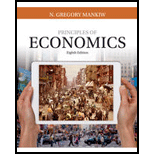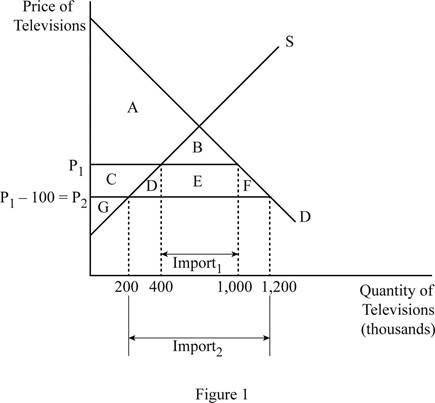
Subpart (a):
The impact of technological advancement on TV production.
Subpart (a):
Explanation of Solution
When the technological advancement in production reduces the world price of televisions, the impact on the importer will be as follows: the importing price will fall, which will reduce the domestic price for televisions; this will increase the demand for the televisions and increase the

The world price was initially P1, where the consumer surplus was the area of A+B, producer surplus was the area of C+G and the total surplus was the area of A+B+C+G. The quantity of televisions imported is denoted by the Import1 on the graph. When the world price falls to P2 (P1 - 100), the consumer surplus increases to the area of A+B+C+D+E+F, which means that the consumer surplus increases by the area of C+D+E+F. The producer surplus becomes the area of G only which means that the producer surplus declined by the area of C. Thus, the total surplus becomes the area of A+B+C+D+E+F+G which means that the total surplus in the economy increased by the area of D+E+F. As a result of the lower price, the domestic supply falls and the demand increases; this means that the imports increase to Import2, as shown on the graph. The changes can be tabulated as follows:
| P1 | P2 | CHANGE | |
| Consumer Surplus | A + B | A + B + C + D + E + F | C + D + E + F |
| Producer Surplus | C + G | G | –C |
| Total Surplus | A + B + C + G | A + B + C + D + E + F + G | D + E + F |
Concept introduction:
International trade: It is the trade relation between the countries.
Export: It is the process of selling domestic goods in the international market. Thus, the goods produced in the domestic firms will be sold to other foreign countries. So, it is the outflow of domestic goods and services to the foreign economy.
Import: It is the process of purchasing the foreign-made goods and services by the domestic country. Thus, it is the inflow of foreign goods and services to the domestic economy.
Subpart (b):
The impact of technological advancement on TV production.
Subpart (b):
Explanation of Solution
The area of C can be calculated as follows:
Area of C is $30 million.
The area of D can be calculated as follows:
Area of D is $10 million.
The area of E can be calculated as follows:
Area of E is $60 million.
The area of F can be calculated as follows:
Area of F is $10 million.
The change in the consumer surplus is by the area of C+D+E+F. Thus, the value of change in consumer surplus can be calculated as follows:
Thus, the value of change in consumer surplus is by $110 million.
The change in the producer surplus is by the area of - C. Thus, the value of change in producer surplus is by $30 million.
The change in the total surplus is by the area of D+E+F. Thus, the value of change in total surplus can be calculated as follows:
Thus, the value of change in total surplus is by $80 million.
Concept introduction:
International trade: It is the trade relation between the countries.
Export: It is the process of selling domestic goods in the international market. Thus, the goods produced in the domestic firms will be sold to other foreign countries. So, it is the outflow of domestic goods and services to the foreign economy.
Import: It is the process of purchasing the foreign-made goods and services by the domestic country. Thus, it is the inflow of foreign goods and services to the domestic economy.
Comparative advantage: It is the ability of the country to produce the goods and services at lower opportunity costs than the other countries.
Subpart (c):
The impact of technological advancement on TV production.
Subpart (c):
Explanation of Solution
When the government imposes a tax of $100 on the imports, the price of the imports will increase by $100; this means that the price level will revert back to the initial world price. This denotes that the consumer surplus, producer surplus, and the total surplus will revert back to the initial levels. The consumer surplus will fall by the area of C+D+E+F, which is $110 million and the producer surplus will increase by the area of C, which is $30 million.
The government would earn a tax revenue through this and the tax revenue can be calculated as follows:
Thus, the government will earn a tax revenue of $60 million.
There will be
Concept introduction:
International trade: It is the trade relation between the countries.
Export: It is the process of selling domestic goods in the international market. Thus, the goods produced in the domestic firms will be sold to other foreign countries. So, it is the outflow of domestic goods and services to the foreign economy.
Import: It is the process of purchasing the foreign-made goods and services by the domestic country. Thus, it is the inflow of foreign goods and services to the domestic economy.
Comparative advantage: It is the ability of the country to produce the goods and services at lower opportunity costs than the other countries.
Subpart (d):
The impact of technological advancement on TV production.
Subpart (d):
Explanation of Solution
The fall in the world price benefits the consumers because they are able to get the commodity at lower price than before. Also, the consumer surplus increases by $110 million. The fall in the world price harms the domestic producers because it leads to a fall in the producer surplus by $30 million. Since the consumer is benefited much more than the producer is harmed, the total welfare of the economy increases. Thus, the reason behind the fall in the world price does not matter in the analysis.
Concept introduction:
International trade: It is the trade relation between the countries.
Export: It is the process of selling domestic goods in the international market. Thus, the goods produced in the domestic firms will be sold to other foreign countries. So, it is the outflow of domestic goods and services to the foreign economy.
Import: It is the process of purchasing the foreign-made goods and services by the domestic country. Thus, it is the inflow of foreign goods and services to the domestic economy.
Comparative advantage: It is the ability of the country to produce the goods and services at lower opportunity costs than the other countries.
Want to see more full solutions like this?
Chapter 9 Solutions
Bundle: Principles of Economics, 8th + MindTap Economics, 1 term (6 months) Printed Access Card
- What are the 4 main parts of circular diagram?arrow_forwardWhat is absolute advantage?arrow_forwardGood Day, Kindly requesting assistance with this also Briefly explain how elasticity affects government health policies in the following cases:● Taxes on unhealthy products (cigarettes, alcohol, sugary drinks)● Subsidizing Preventive Care (e.g., vaccines, screenings)● Drug Price Controls & Generic Substitutions● Co-Payments & Insurance Designarrow_forward
- Good Day, Kindly assist with the following query: ● Cost–benefit Analysis● Cost-effectiveness analysis● Cost–utility analysis● Cost analysis or Cost Minimization Analysis For each of the following health policy questions listed below, identify and briefly explain which type of economic evaluation in question above would be most appropriate to use: ● The Ministry of Finance wants to know whether it is worth investing further resources into malaria control or building new primary schools? ● The Ministry of Health wants to compare the costs of receiving intravenous antibiotics in a hospital with receiving the same antibiotics (at the same doses) at home via a home health care service. ● The Ministry of Health wants to compare the costs and outcomes of two interventions for the treatment of early stage breast cancer: mastectomy without breast reconstruction compared to breast conserving surgery and radiotherapy (breast conservation). ● A malaria control programme wants to use economic…arrow_forwardSubstitute X=20. Can you show me how to do question 1 pleasearrow_forwardBlue Air Inc., has net sales of $740,000 and accounts receivables of $163,000. What is the firm's accounts receivables turnover?arrow_forward
- Please answer questions D-H, I have already answered A , B,C but it may help you to still solve them yourself. Thank you!arrow_forward2. A firm’s production function is given by:Q = 10KLThe unit capital and labour costs are 2 and 1 pounds respectively. The firm is contracted to produce2000 units.(a) Write out the optimisation problem of the firm. (b) Express this problem using a Lagrangian function. (c) Find values of K and L which fulfil the contract with minimal cost to the firm. (d) Calculate the total cost to the firm.arrow_forward3. Consider the following estimated regression equation, estimated using a sample of firms, where RDis total firm spending on research and development in USD ($), Revenue is total firm revenuein USD ($), and W ages is the firms’ total spending on wages in USD ($) (standard errors inparentheses):RDd = 1000(600)+ 0.5(0.1)Revenue + 1.5(0.5)W ages,(a) Interpret the coefficients on each of the explanatory variables. (b) Which of the three coefficients are statistically significant at the 5% level of significance? Howdo you know? A researcher runs a two-sided statistical test of the null hypothesis that both the coefficients onthe explanatory variables above are jointly equal to 0.25 (mathematically, that β1 = β2 = 0.25),and reports a p-value of 0.045.(c) What does this p-value mean for the outcome of the test? (d) What would an appropriate two-sided alternative hypothesis look like?arrow_forward
 Principles of Macroeconomics (MindTap Course List)EconomicsISBN:9781285165912Author:N. Gregory MankiwPublisher:Cengage Learning
Principles of Macroeconomics (MindTap Course List)EconomicsISBN:9781285165912Author:N. Gregory MankiwPublisher:Cengage Learning Principles of Economics, 7th Edition (MindTap Cou...EconomicsISBN:9781285165875Author:N. Gregory MankiwPublisher:Cengage Learning
Principles of Economics, 7th Edition (MindTap Cou...EconomicsISBN:9781285165875Author:N. Gregory MankiwPublisher:Cengage Learning Essentials of Economics (MindTap Course List)EconomicsISBN:9781337091992Author:N. Gregory MankiwPublisher:Cengage Learning
Essentials of Economics (MindTap Course List)EconomicsISBN:9781337091992Author:N. Gregory MankiwPublisher:Cengage Learning Principles of MicroeconomicsEconomicsISBN:9781305156050Author:N. Gregory MankiwPublisher:Cengage Learning
Principles of MicroeconomicsEconomicsISBN:9781305156050Author:N. Gregory MankiwPublisher:Cengage Learning Principles of Economics (MindTap Course List)EconomicsISBN:9781305585126Author:N. Gregory MankiwPublisher:Cengage Learning
Principles of Economics (MindTap Course List)EconomicsISBN:9781305585126Author:N. Gregory MankiwPublisher:Cengage Learning Principles of Microeconomics (MindTap Course List)EconomicsISBN:9781305971493Author:N. Gregory MankiwPublisher:Cengage Learning
Principles of Microeconomics (MindTap Course List)EconomicsISBN:9781305971493Author:N. Gregory MankiwPublisher:Cengage Learning





